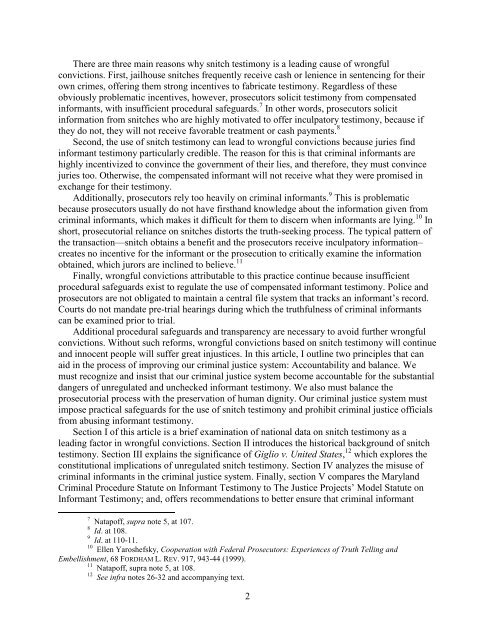attachment_id=996 - UDC Law Review
attachment_id=996 - UDC Law Review
attachment_id=996 - UDC Law Review
You also want an ePaper? Increase the reach of your titles
YUMPU automatically turns print PDFs into web optimized ePapers that Google loves.
There are three main reasons why snitch testimony is a leading cause of wrongful<br />
convictions. First, jailhouse snitches frequently receive cash or lenience in sentencing for their<br />
own crimes, offering them strong incentives to fabricate testimony. Regardless of these<br />
obviously problematic incentives, however, prosecutors solicit testimony from compensated<br />
informants, with insufficient procedural safeguards. 7 In other words, prosecutors solicit<br />
information from snitches who are highly motivated to offer inculpatory testimony, because if<br />
they do not, they will not receive favorable treatment or cash payments. 8<br />
Second, the use of snitch testimony can lead to wrongful convictions because juries find<br />
informant testimony particularly credible. The reason for this is that criminal informants are<br />
highly incentivized to convince the government of their lies, and therefore, they must convince<br />
juries too. Otherwise, the compensated informant will not receive what they were promised in<br />
exchange for their testimony.<br />
Additionally, prosecutors rely too heavily on criminal informants. 9 This is problematic<br />
because prosecutors usually do not have firsthand knowledge about the information given from<br />
criminal informants, which makes it difficult for them to discern when informants are lying. 10 In<br />
short, prosecutorial reliance on snitches distorts the truth-seeking process. The typical pattern of<br />
the transaction—snitch obtains a benefit and the prosecutors receive inculpatory information–<br />
creates no incentive for the informant or the prosecution to critically examine the information<br />
obtained, which jurors are inclined to believe. 11<br />
Finally, wrongful convictions attributable to this practice continue because insufficient<br />
procedural safeguards exist to regulate the use of compensated informant testimony. Police and<br />
prosecutors are not obligated to maintain a central file system that tracks an informant’s record.<br />
Courts do not mandate pre-trial hearings during which the truthfulness of criminal informants<br />
can be examined prior to trial.<br />
Additional procedural safeguards and transparency are necessary to avoid further wrongful<br />
convictions. Without such reforms, wrongful convictions based on snitch testimony will continue<br />
and innocent people will suffer great injustices. In this article, I outline two principles that can<br />
aid in the process of improving our criminal justice system: Accountability and balance. We<br />
must recognize and insist that our criminal justice system become accountable for the substantial<br />
dangers of unregulated and unchecked informant testimony. We also must balance the<br />
prosecutorial process with the preservation of human dignity. Our criminal justice system must<br />
impose practical safeguards for the use of snitch testimony and prohibit criminal justice officials<br />
from abusing informant testimony.<br />
Section I of this article is a brief examination of national data on snitch testimony as a<br />
leading factor in wrongful convictions. Section II introduces the historical background of snitch<br />
testimony. Section III explains the significance of Giglio v. United States, 12 which explores the<br />
constitutional implications of unregulated snitch testimony. Section IV analyzes the misuse of<br />
criminal informants in the criminal justice system. Finally, section V compares the Maryland<br />
Criminal Procedure Statute on Informant Testimony to The Justice Projects’ Model Statute on<br />
Informant Testimony; and, offers recommendations to better ensure that criminal informant<br />
7 Natapoff, supra note 5, at 107.<br />
8 Id. at 108.<br />
9 Id. at 110-11.<br />
10 Ellen Yaroshefsky, Cooperation with Federal Prosecutors: Experiences of Truth Telling and<br />
Embellishment, 68 FORDHAM L. REV. 917, 943-44 (1999).<br />
11 Natapoff, supra note 5, at 108.<br />
12 See infra notes 26-32 and accompanying text.<br />
2














